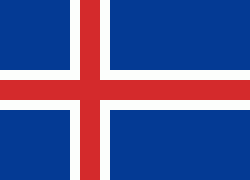Icelandic króna
kr
The króna or krona (sometimes called Icelandic crown; sign: kr; code: ISK) is the currency of Iceland. Iceland is the second-smallest country by population, after the Seychelles, to have its own currency and monetary policy.Like the Nordic currencies (such as the Danish krone, Swedish krona and Norwegian krone) that participated in the historical Scandinavian Monetary Union, the name króna (meaning crown) comes from the Latin word corona ("crown").
The name "Icelandic crown" is sometimes used alternatively, for example in the financial markets.
Country
-
Iceland
Iceland (Ísland, ) is a Nordic island country in the North Atlantic Ocean and in the Arctic Ocean. Iceland is the most sparsely populated country in Europe. Iceland's capital and largest city is Reykjavík, which is home to about 36% of the population. Iceland is the largest part of the Mid-Atlantic Ridge that rises above sea level, and its central volcanic plateau is erupting almost constantly. The interior consists of a plateau characterised by sand and lava fields, mountains, and glaciers, and many glacial rivers flow to the sea through the lowlands. Iceland is warmed by the Gulf Stream and has a temperate climate, despite a high latitude just outside the Arctic Circle. Its high latitude and marine influence keep summers chilly, and most of its islands have a polar climate.
According to the ancient manuscript Landnámabók, the settlement of Iceland began in 874 AD when the Norwegian chieftain Ingólfr Arnarson became the first permanent settler on the island. In the following centuries, Norwegians, and to a lesser extent other Scandinavians, immigrated to Iceland, bringing with them thralls (i.e., slaves or serfs) of Gaelic origin.
